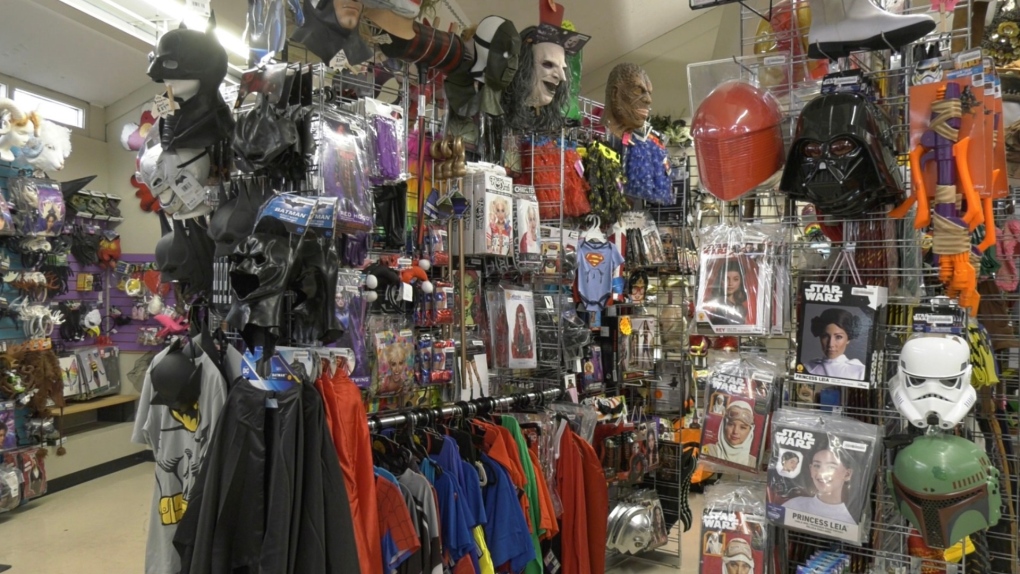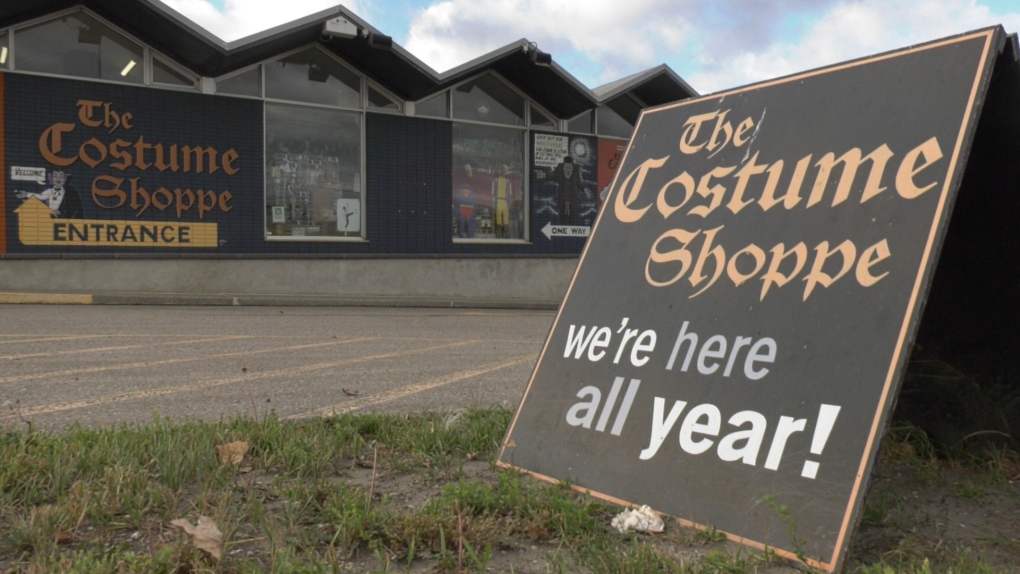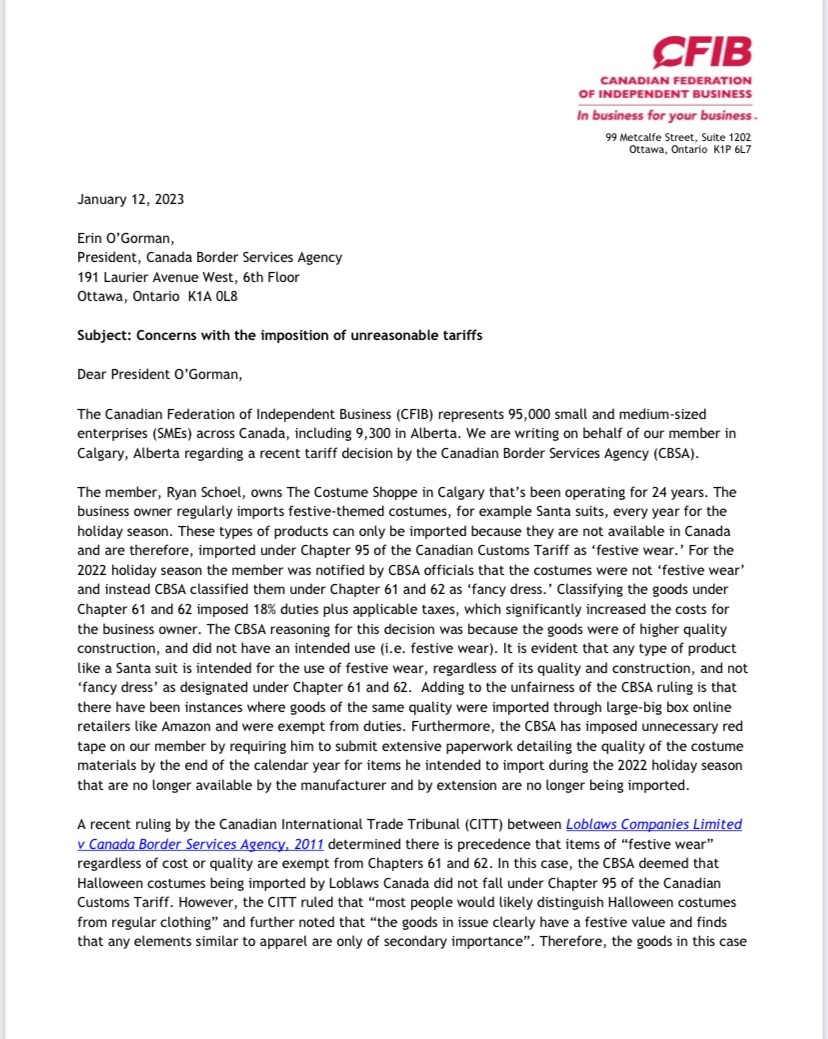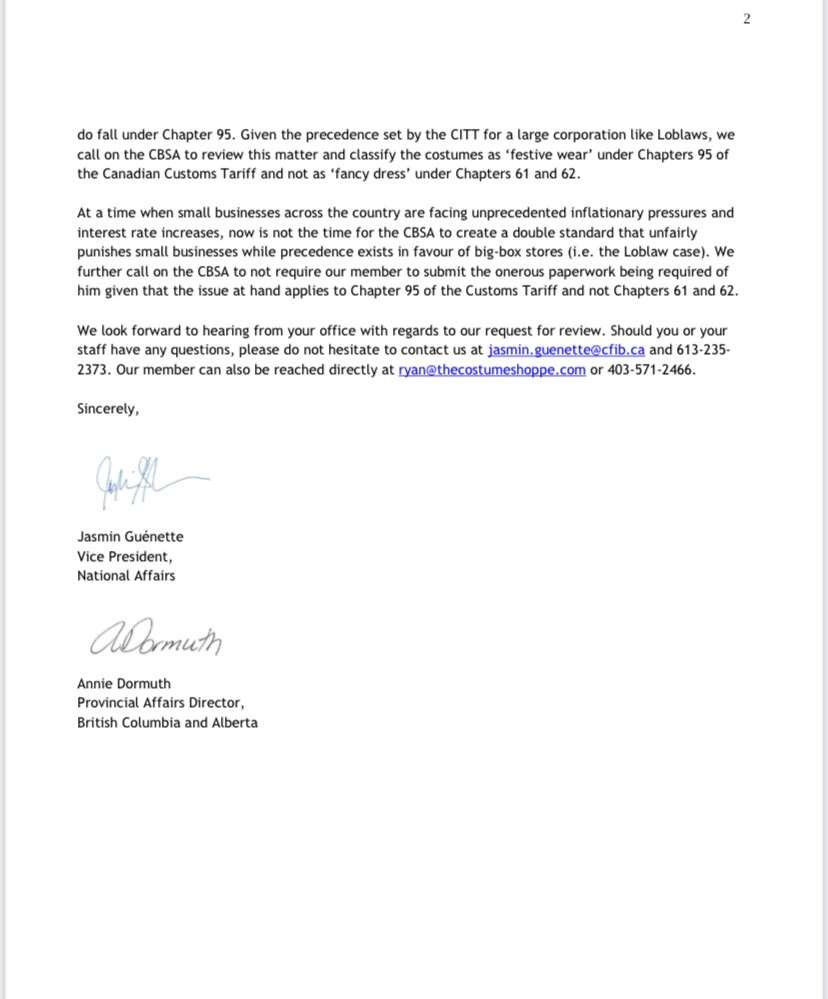Calgary costume business faces tens of thousands of dollars in import duty fees
A Calgary costume business says it's wrongfully being charged import duty fees estimated at more than $100,000 following a recent tariff decision made by the Canadian Border Services Agency (CBSA).
The Costume Shoppe, located along Blackfoot Trail S.E., has been operating for nearly 25 years and regularly imports themed costumes for special occasions and holidays.
Store owner Ryan Schoel says he's been importing his costumes under Chapter 95.05 of the Canadian Customs Tariff, which classifies the goods as "festive wear" and comes with zero import duties.
He was notified late last year, however, that costumes were no longer considered "festive wear" imports and instead are now classified as "fancy dress" imports under chapters 61 and 62.
Classifying the goods under chapters 61 and 62 imposed 18 per cent duty fees, plus applicable taxes, which have now been charged retroactively to the business dating back to 2021.
"What's frustrating is that there's no logic behind it. You can't tell me that a Scream costume or a Ghostface mask is something that you're going to wear every day as clothing," Schoel said.
"I sell Halloween costumes. I sell fun. I'm not selling something that you're going to go and wear to Parliament Hill, unless you're going for a Halloween party or a festive event of course, but you're not going to wear it every day to work. That's just the bottom line."
 Costume Shoppe store owner Ryan Schoel says he was notified in 2022 that costumes were no longer considered 'festive wear' imports.
Costume Shoppe store owner Ryan Schoel says he was notified in 2022 that costumes were no longer considered 'festive wear' imports.
Schoel says the CBSA first asked him to look at his import list and gave him an interim report, explaining to him the vast majority of his costume inventory would now be reclassified to an import good of "clothing."
He now has to pay to refile his import inventory dating all the way back to 2020.
"I have to go backwards now, four years, for stuff I've already sold and resubmit all of it. I've got to pay somebody to do all the paperwork, submit it and then they're going to send me the bill to pay it," Schoel said.
"So this could be as much as $100,000 or $200,000, based on all of the import that's come in over the last four years, and the only way to fight this is to pay first and then you can appeal, so it's a problem because I don't have the wherewithal coming out of the pandemic."
Schoel has more than 2,500 costumes in stock at his store, including accessories that now have to be reclassified as well.
For example, a headband with horns on top for a devil costume is now considered to be a standard headband used in everyday life.
"Utilitarian use means that these are headbands, designed to push your hair back. It makes sense, but one with horns on top of it, its primary use is for its horns," Schoel said.
"The CBSA said I should have known better and that these are headbands. There's just no rhyme or reason to this."
 Costume Shoppe store owner Ryan Schoel says he was notified in 2022 that costumes were no longer considered 'festive wear' imports.
Costume Shoppe store owner Ryan Schoel says he was notified in 2022 that costumes were no longer considered 'festive wear' imports.
UNFAIR, SAYS CANADIAN FEDERATION OF INDEPENDENT BUSINESS
The Canadian Federation of Independent Business (CFIB) represents 9,300 small and medium-sized businesses in Alberta and wrote to the CBSA to express its concern.
It says there have been instances where costumes or other goods of the same quality were imported through large, big-box online retailers like Amazon who were exempt from such duties.
A recent ruling by the Canadian International Trade Tribunal (CITT), Loblaws Companies Limited v Canada Border Services Agency, 2011, determined there is precedence that items of "festive wear" regardless of cost or quality are exempt from chapters 61 and 62.
In this case, the CBSA deemed Halloween costumes being imported by Loblaws Canada did not fall under Chapter 95 of the Canadian Customs Tariff.
However, the CITT ruled that "most people would likely distinguish Halloween costumes from regular clothing" and further noted "the goods in issue clearly have a festive value and finds that any elements similar to apparel are only of secondary importance."
Andrew Sennyah, CFIB Alberta senior policy analyst, says given the precedence set by the CITT for a corporation like Loblaws, the CBSA should classify costumes for small businesses as "festive wear."
"That was a decision rendered by the tribunal and those same expectations should be passed on to small businesses like the Costume Shoppe to ensure there is a level playing field. It can't be one rule for you and one rule for another -- we need to draw the line," Sennyah said.
"If agencies and the federal government are here to play judge, jury and executioner, then all businesses should be treated fairly."
Schoel says the CBSA has been vague with him on whether or not other costume businesses in Calgary or across the country will have to pay similar import duties.
"According to CBSA, everybody's going to have to pay -- at some point they're going to get to them. This is what I've been told. However, we all know each other. We pick up the phone and talk to each other," he said.
"So really, at the end of the day, there's only a small number of importers, some I know for a fact are not paying, and other, bigger stores win big cases and that's what sets the tone for everybody. As a matter of fact, that's what they're using against me to say that these costumes don't fit that same parameter."
CTV News contacted other big-box retailers like Canadian Tire-owned Party City, Loblaws and Spirit of Halloween to inquire if they are paying extra import duties on their Halloween costumes, but no responses have been received.
Several small businesses in Calgary offering costumes were also contacted, but no other interviews were granted for fear of retaliation from the CBSA.
 A letter from the CFIB to the CBSA.
A letter from the CFIB to the CBSA.
 A letter from the CFIB to the CBSA.
A letter from the CFIB to the CBSA.
THE CANADIAN BORDER SERVICES AGENCY RESPONDS
The CBSA was approached with the opportunity to provide an interview or statement.
Wednesday evening, the CBSA offered a statement.
It acknowledged receiving correspondence from the CFIB on the matter and said it responded to the letter on Jan. 30.
It deferred further comment on the letter and response to the CFIB.
Asked what its justification was for the tariff decision, the CBSA said its administrative policy regarding the tariff classification of costumes is outlined in Departmental Memorandum D10-14-62. (link)
"The textile costumes classifiable in chapters 61 and 62 are distinguished from those classifiable in Chapter 95 by the nature of the goods. Textile costumes that are designed and constructed in a manner that allows for repetitive use, that are comparable in quality and value to articles of clothing (e.g., theatrical costumes, rental costumes, historical re-enactment costumes, etc.) are classified in Chapter 61 or 62, as appropriate, and excluded from Chapter 95 by the application of Note 1(e) to that chapter. In order for a textile costume to qualify for classification as a festive article of Chapter 95, the garment must exhibit significant deficiencies in terms of styling, construction, finishing touches and embellishments," the CBSA's statement read.
"Costumes are referred to as articles of fancy dress in the Harmonized System. This is an international nomenclature that uses British English as its working language. The Oxford Dictionary definition of fancy dress is: "an unusual or amusing costume worn to make someone look like a famous person, fictional character or an animal, especially as part of a theme at a party."
The CBSA also said it is aware of the recent CITT Loblaws ruling.
"Verification officers take all relevant information into account when making tariff classification decisions. In a verification, each item is considered individually, and a determination is made based on the specific item and, in this case, how it meets the criteria set out in the Harmonized System and departmental policies," it said.
CTV News asked the CBSA whether it would remove the import duties from the Costume Shoppe:
"Should an importer disagree with any of the tariff classification decisions in a compliance verification, appeal rights are available under the Customs Act."
CTVNews.ca Top Stories

opinion Tom Mulcair: Prime Minister Justin Trudeau's train wreck of a final act
In his latest column for CTVNews.ca, former NDP leader and political analyst Tom Mulcair puts a spotlight on the 'spectacular failure' of Prime Minister Justin Trudeau's final act on the political stage.
B.C. mayor gets calls from across Canada about 'crazy' plan to recruit doctors
A British Columbia community's "out-of-the-box" plan to ease its family doctor shortage by hiring physicians as city employees is sparking interest from across Canada, says Colwood Mayor Doug Kobayashi.
'There’s no support': Domestic abuse survivor shares difficulties leaving her relationship
An Edmonton woman who tried to flee an abusive relationship ended up back where she started in part due to a lack of shelter space.
opinion King Charles' Christmas: Who's in and who's out this year?
Christmas 2024 is set to be a Christmas like no other for the Royal Family, says royal commentator Afua Hagan. King Charles III has initiated the most important and significant transformation of royal Christmas celebrations in decades.
Baseball Hall of Famer Rickey Henderson dead at 65, reports say
Rickey Henderson, a Baseball Hall of Famer and Major League Baseball’s all-time stolen bases leader, is dead at 65, according to multiple reports.
Arizona third-grader saves choking friend
An Arizona third-grader is being recognized by his local fire department after saving a friend from choking.
Germans mourn the 5 killed and 200 injured in the apparent attack on a Christmas market
Germans on Saturday mourned the victims of an apparent attack in which authorities say a doctor drove into a busy outdoor Christmas market, killing five people, injuring 200 others and shaking the public’s sense of security at what would otherwise be a time of joy.
Blake Lively accuses 'It Ends With Us' director Justin Baldoni of harassment and smear campaign
Blake Lively has accused her 'It Ends With Us' director and co-star Justin Baldoni of sexual harassment on the set of the movie and a subsequent effort to “destroy' her reputation in a legal complaint.
Oysters distributed in B.C., Alberta, Ontario recalled for norovirus contamination
The Canadian Food Inspection Agency has issued a recall due to possible norovirus contamination of certain oysters distributed in British Columbia, Alberta and Ontario.

































